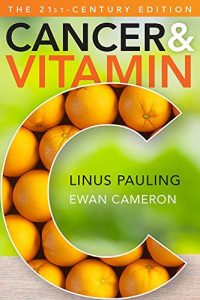
Linus Pauling was a brilliant scientist and a pioneer in the field of chemistry. He won the Nobel Prize for his work on quantum mechanics and molecular biology. Ewan Cameron was a doctor who researched the potential benefits of vitamin C for cancer patients. Together, these two men created an effective protocol for treating cancer with vitamin C. In 1976, Linus Pauling and Ewan Cameron published their findings from testing vitamin C as a possible treatment for cancer. At that time, researchers believed that serious cancers were caused by random genetic mutations, so they didn’t believe that any intervention could prevent or treat cancer. However, Pauling and Cameron’s research showed otherwise.
Cancer Overview
Cancer occurs when cells in the body begin to divide uncontrollably. The uncontrolled cell growth leads to tumors, which can impair normal organ functions and cause death. Cancer is not a single disease, but many diseases that can affect any part of the body. The most common cancers in adults are breast cancer, lung cancer, prostate cancer, colorectal cancer, and skin cancers (including melanoma). In children, the most common cancers are leukemia, lymphoma, and sarcoma. If left untreated, most cancers will spread to other parts of the body. This can cause a wide variety of symptoms, depending on the type of cancer and where it spreads. For example, breast cancer that spreads to the lungs can cause shortness of breath. When cancer spreads to the bone, it causes a pain that cannot be treated with painkillers. The only known cure for cancer is surgery to remove the tumors, radiation therapy, and chemotherapy. Unfortunately, these treatments are far from perfect. They can cause a wide variety of unpleasant side effects, including nausea, hair loss, fatigue, and even death.
What Are the Benefits of Vitamin C?
Vitamin C is a water-soluble vitamin that plays a vital role in human health. It is essential for the production of collagen, which is the main component of connective tissue. Vitamin C can also help to lower blood pressure, protect against cardiovascular diseases, and reduce the risk of stroke. Research has shown that vitamin C can also protect against many types of cancers. In fact, vitamin C has been considered a potential cancer treatment for a long time. The reason for this is that vitamin C can help to fight cancer in multiple ways. It can lower the levels of certain hormones that promote the growth of tumors, reduce inflammation, and boost the immune system.
How to Implement the Vitamin C Protocol for Cancer
The vitamin C protocol for cancer consists of taking high doses of vitamin C every day, along with plenty of hydration. The recommended daily dose of vitamin C is about 1,000 mg, but the protocol is to take 10,000 mg per day. You can take all of the vitamin C at once or break it up into multiple doses throughout the day. To get the most out of the vitamin C protocol, you must drink at least 8 glasses of water every day. This will help your body to absorb the vitamin C more efficiently. The protocol also includes a “loading dose” of vitamin C. This is actually a series of high doses taken over a few days. The loading dose is taken by people with advanced cancer, while standard doses are recommended for people with early-stage cancer.
Side Effects of This Treatment
The vitamin C protocol for cancer is generally safe, with only mild side effects. These include diarrhea, dizziness, cramps, and fatigue. These side effects are often temporary, and you can reduce their severity by taking vitamin C with food. You might also notice that your stools turn bright yellow as a result of the excess vitamin C. While this is harmless, it might be embarrassing if you have others help you with bowel movements. It’s important to note that the loading dose can have serious side effects, including kidney stones and gastrointestinal bleeding. If you have serious health conditions, you should consult with a doctor before trying this protocol.
How to Optimize the Vitamin C Protocol for Better Results
You can further increase the benefits of the vitamin C protocol by adding more nutrients to your diet. For example, green tea, turmeric, and omega-3 fatty acids all help to prevent cancer. Green tea contains polyphenol, which has been shown to reduce the risk of many types of cancers, including breast and colorectal cancer. Turmeric is another spice with powerful anti-cancer properties. It has been shown to prevent several cancers, including breast and colorectal cancer. Omega-3 fatty acids are found in many types of fish. They have been shown to prevent several types of cancer, including colorectal cancer.
Final Words
Vitamin C is a cheap and effective treatment for many types of cancers. It can be combined with other therapies, such as radiation and chemotherapy, to improve their effectiveness. Indeed, many studies have shown that vitamin C can protect against cancer, and can even shrink tumors in some cases. While vitamin C is effective in many cases, it is not a magic bullet. People with advanced-stage cancer should not expect this protocol to cure their disease. However, even if it doesn’t cure your cancer, it can help to reduce your symptoms, enable other treatments to work better, and improve your quality of life.






